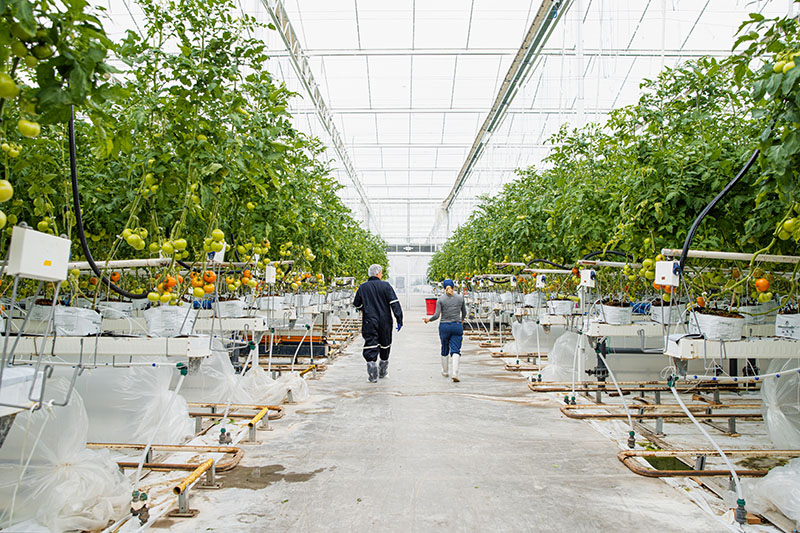
Apr 7, 2022
Greenhouses, worker focus help Wholesum grow vegetables
This year marks a milestone year for Wholesum Family Farms. The third-generation, family-operated grower of greenhouse tomatoes and other vegetables marks 30 years of shipping organically certified produce.
The Amado, Arizona-based organic produce pioneer has long worked to create “a more noble food system.” In 2022, it also celebrates a decade of treating its workers and communities responsibly through Fair Trade Certification.
Wholesum grows 100% organic produce on 600 acres of greenhouse and open-air production in three growing regions in Mexico and Arizona. It focuses on tomatoes, cucumbers, squash, bell peppers and eggplant.
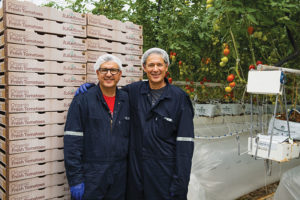
Growing industry
“There is no denying that the organic industry is growing tremendously from what used to be a very small, niche industry,” said Ricardo Crisantes, chief commercial officer at Wholesum. “Despite being the underdog when it comes to resources and funding, organics have been consistently growing and gaining market share. Today, organic produce has become a large and significant sector that has been getting more attention in recent years.”
December through May in Culiacan, Sinaloa, Mexico, Wholesum grows all of its vegetables. In Immures, Sonora, Mexico, tomatoes, cucumbers and peppers are grown throughout the year. At Wholesum’s newest state-of-the-art, all glass organic greenhouses, opened in December in Amado, Arizona, it grows tomatoes all year.
During the 1940s, Wholesum’s founders realized they needed a larger assortment of products and grew onions, green beans, sugar and snap peas, celery, melons and strawberries. Differences in environment and production practices led the Crisanteses to experiment with the best crops.
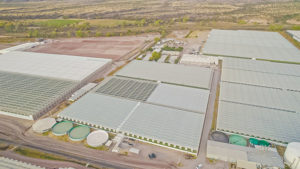
“We have an assortment of products that we grow very well,” said Theojary Crisanteses Jr., chief operations officer. “We are constantly working towards improving our varieties on agronomic factors such as yields, disease resistance and shelf life, as well as flavor and aesthetics because at the end of the day, we also want it to be a profitable endeavor.”
Wholesum’s roots date to the 1920s, when family pioneer Miguel Crisanteses Gatzionis migrated from Greece to Mexico. In 1930, he began growing tomatoes in Sinaloa on a plot of land he cleared with a machete and a mule. His son, Theojary Crisantes Sr., president of the board of directors, was influenced by Cesar Chavez’s farmworker justice and empowerment advocacy and Rachel Carson’s infamous book Silent Spring, which advocated for Earth’s environmental future.
A University of California, Davis, agronomist, the elder Theojary became an organic farming trailblazer. His deep love of agriculture and respect for the land and the people working on it drove him to find a new and more noble growing system that enhanced instead of stripped the earth’s resources. Theojary explored growing methods that promote human wellbeing and ecological balance.
“Once that seed was planted, his determination to succeed outweighed any of the challenges that were put before him,” said Joanna Jaramillo, marketing manager. “His passion and determination served as our foundation for becoming problem solvers and leaders in the organic industry.”
After transitioning the family’s farms to organics and sustainable practices, Theojary Crisantes’ sons – Theojary Jr., Ricardo, Adrian and son-in-law, Jonathan Alarcon – took over operations.
A university-trained agronomist and organic vegetable production expert, Adrian, who died in 2014, traveled to Holland where the Crisantes were introduced to greenhouse technology that the family adapted to Mexico and Arizona climates.
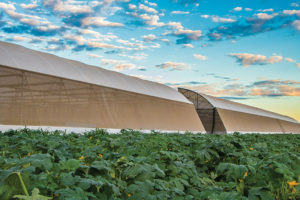
All out for organics
In 1992, the Crisanteses achieved USDA organic certification and worked to transition to organic. By 2014, all production was organic certified.
In a family business, more is at stake, including the family and employees’ livelihoods and protecting the family’s legacy.
“You want to continuously improve upon what the past generation has done, learn from it, honor it, respect it and evolve it,” Ricardo Crisantes said.
A more genuine employee connection produces workforces that respect leadership and support the company vision.
“Each generation has contributed and built upon the contributions of the prior generation,” he said. “When you work in produce, you are inherently in a business that has a purpose of nourishing the world. We find that a lot of family farming operations have a similar trajectory and are fueled by this purpose.”
Believing they must address challenges, including climate change, resource and water scarcity, and social issues such as inequality and community development, the Crisanteses started a sustainability department. In measuring the company’s sustainability efforts, the department monitors energy consumption, water use, material inputs and outputs, as well as recycling and waste. In 2020, Wholesum set a goal of identifying all farm inputs. Coding as renewable or nonrenewable, Wholesum worked to change non-renewable to renewable inputs where possible.
Sustainable journey
“Sustainability is a journey,” Ricardo Crisantes said. “Sustainability goes way beyond energy use. It’s about making a difference in this world. A lot of sources are getting scarce, and it’s up to us as an industry to act accordingly.
Transitioning to organic shed light on other areas, displaying where Wholesum could do better.
“While this (sustainability) may be a cornerstone of our operations, there is no denying that it can be challenging, and even messy, at times,” said Theojary Cristantes Jr. “Our goals are to create a more noble food system and a healthier world for our future generations.”
Greenhouse technology affords more efficient use of space and controls agronomic variables. Greenhouses employ automated air pressure and climate control systems and disperse water via drip irrigation and water recirculation.
Innovative agronomics
At two farms, container growing systems conserve irrigation water and grow in areas where ground growing wouldn’t be successful. Coconut husks, solid organic fertilizers and compost teas host microbes, bacteria and fungi, supporting the soil food web’s biological processes similar to soil
In cucumber greenhouses, ladybugs prey on aphids. A research and development team breeds more than 35,000 ladybugs weekly. An onsite earthworm farm stimulates crop bioactivity.
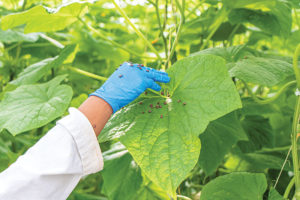
“With organic production, any pest or disease outbreaks can be truly devastating,” said Theojary Cristantes. “We have had our share of losses while trying to understand the best practices and optimal production methods for the crops we grow. With organics, quick solutions like the use of agrochemicals is off the table. We have to learn the best methods of prevention, train our workers and retain our employees so that we can be efficient with a strong and empowered workforce and deliver on the commitments we have made to our customers.”
Breeding for success
Collaborating with seed breeders, Wholesum tests varieties for genetic build for disease resistance and withstanding production methods. Various biocontrol methods prevent pest outbreaks.
Growing challenges vary by region. High-tech Arizona and northern Mexico greenhouses offer favorable climate and sunlight and bring new efficiencies and sustainability, optimal for year-round tomato production. In central Mexico, low- and mid-tech shade houses and greenhouses and open fields produce product seasonally. The complementary growing strategy provides peak season volume and consistent supplies.
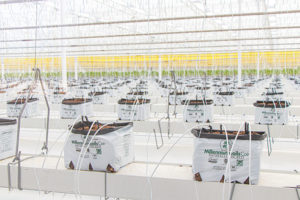
Wholesum is looking into technology that can make more precise harvest projections. Tools monitor plant growth and behavior, while automation and robotics have entered the stage.
“All of these tools will help complement our current talented labor force and can be game changers for our growers,” said Theojary Crisantes. “Organic production is about finding new, creative and ecologically friendly ways of solving problems, such as pests and diseases, the two greatest enemies to organic farming.”
A philosophy of giving
By promoting fair wages and working conditions, Fair Trade Certification improves the farmworker communities and offers environmental protection and community development. Since Wholesum became Fair Trade Certified in 2012, farmworkers have invested in community development projects, including education, housing, nutrition and health services.
Wholesum also donates to U.S. and Mexico organizations promoting social justice, equity and a fair immigration system.
“We have since learned that what you put into the communities you participate in is what you will gain from them,” Ricardo Crisantes pointed out.
COVID-19 helped organic consumption spike in 2020. Even post COVID, organic produce retained an upward trend of year-over-year growth. Specialty and high flavor varieties, including Wholesum’s snacking and heirloom tomatoes and long English and Persian cucumbers, over-index in organics.
“Specialty and organic go hand in hand,” said Crisantes.
Wholesum remains bullish about the future of organics.
“The organic market continues on a growth spurt with increased sales of organic produce year over year,” observed Crisantes. “Consumer demand is one major force that has been propelling this shift.”






